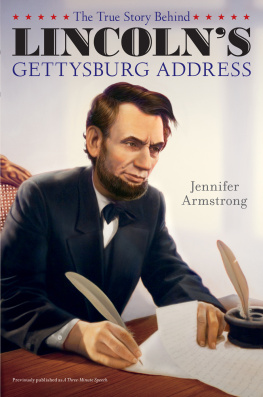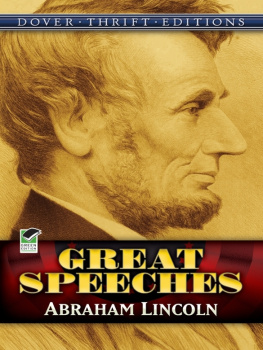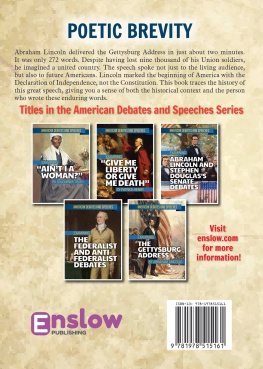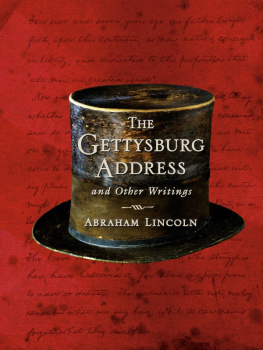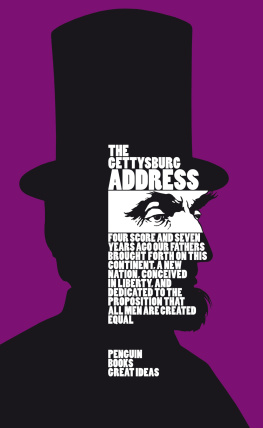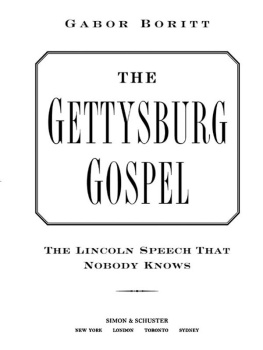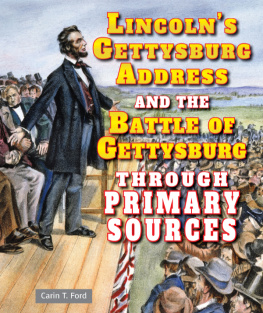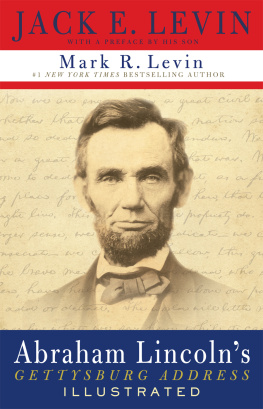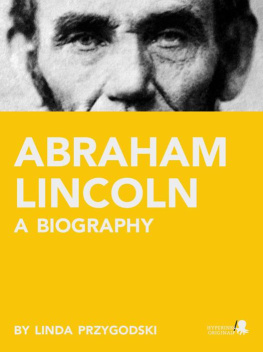JENNIFER ARMSTRONG has always been captivated by history. Her more than one hundred books for children and teens include many historical fiction and nonfiction titles, including Photo by Brady: A Picture of the Civil War . She lives in Saratoga Springs, New York, with her daughter.

ALADDIN
Simon & Schuster, New York
Meet the author,
watch videos, and get extras at
KIDS.SimonandSchuster.com
B IBLIOGRAPHY

FOR MY UNDERSTANDING of this speech and its significance I owe a large debt to Garry Willss masterful book, Lincoln at Gettysburg: The Words That Remade America. Other books and websites that were useful are listed below.
Long, E. B., with Barbara Long. The Civil War Day by Day: An Almanac 18611865. Garden City, New York: Doubleday, 1971.
Ward, Geoffrey C. The Civil War: An Illustrated History. New York: Alfred A. Knopf, 1990.
Wheeler, Richard. Voices of the Civil War. New York: Penguin, 1976.
Wills, Garry. Lincoln at Gettysburg: The Words That Remade America. New York: Simon & Schuster, 1992.
Websites:
Library of CongressGettysburg Address Exhibition
http://www.loc.gov/exhibits/gadd
Americas Story from Americas Library: Jump Back in Time
http://www.americaslibrary.gov
Library of Congress Historical DocumentsThe Declaration of Independence
http://www.memory.loc.gov/const/declar.html
Abraham Lincoln Online
www.abrahamlincolnonline.org
Lincoln-Douglas Debates on History Channel Online
www.history.com/topics/lincoln-douglas-debates
C HAPTER O NE

IN THE BEGINNING
IN THE BEGINNING were the British colonies in North America, separated by an ocean from the land they had left behind. Over the years the colonists became less and less British and more and more something new: American. Here, a man or a woman was not judged by his family or her title. Instead they were judged by their actions. There were no lords or dukes or baronesses. Here, no family deserved more wealth or more land or more opportunity than anyone else simply because they had an aristocratic ancestor. Those ancestors were buried in the ground an ocean away. Their voices did not reach across the Atlantic to demand special treatment. Here on the American continent people earned their place.
Not only that, but the colonists felt they had earned something else: the right to decide for themselves what should happen on this side of the great ocean.
The colonists wished to create their own laws.
The king said no.
The colonists wished to have some say in the government that collected taxes from them.
The king said no.
The colonists wished to choose their own judges.
The king said no.
The colonists wished for this, that, and another reasonable thing. To each request the king said no. Picture a father snapping at his children, telling them to be quiet and go to their rooms and stop asking so many questions.
The colonists were beginning to wonder why they should continue to be ruled this way. Every child outgrows the authority of the parent. The American colonies had finally grown up. They no longer wished to be ruled by a king who was so far away he might as well live in a fairy story. It was time to make a new nation, a nation whose only parent would be freedom. This nation would steer its course by a revolutionary idea: All people were created equal. It would be a democracy, a government of the people, not an aristocracy, a government of kings and princely lords. That was the idea the country would dedicate itself to.
This was not the sort of idea that Britain was going to sit still for. King George sent troops to knock heads together in the rebellious and troublesome colonies. America knocked back.
On July 4, 1776, America officially declared itself to be independent of Britain, but it took years of deadly war to make that independence a reality. At last, in 1783, the British sailed away from the new United States of America, and the war was over.
This new nation had been born in a storm of bullets and cannon fire, and Americans had pulled together with united hearts in the wartime emergency. But now it was time to see what kind of nation it was when the emergency was over. A Union of free states. What a grand idea! What kind of place was it going to be, where all men were created equal?
What kind ofbut wait. Back up a moment. All men were created equal?
What about the slaves?
C HAPTER T WO

A PECULIAR INSTITUTION
THE AMERICAN CONTINENT was a horn of plenty. Great herds of animals roamed its plains and threaded through the forests. In the rivers and ocean bays, sunlight gleamed silver off the scaly fins of countless fish. The earth was rich. Plant a seed, and behind your back a tree would grow as you walked away. In the Northern states vast forests supplied the trees and timber for ships, and the fuel for factories and towns. Settlements were close together. Farms were small. Merchants traded for thick furs from the cold woods. In the busy ports the wharves were clogged with imported furniture and pottery and fine cloth from Europe and the lands of distant Asia.

In the Southern states farmers spread out thinly across the broad land. Tobacco, cotton, and rice grew green and rustling in the warm air. Immense plantations of crops required immense numbers of cheap farmhands to do the sowing, weeding, and harvesting. By the time of the American Revolution, the Southern states relied heavily on slave labor.
At the time that the colonies were preparing to declare independence and form a new government, the question of slavery arose. Perhaps slavery could be eliminated over time, suggested some of the founding fathers from the North. After all, what good is all this talk of equality if half our colonies rely on slave labor? But some of the founders from the South threatened that any discussion about discouraging the slave trade would drive them out of the room. End of discussion. You can declare independence on your own, but leave us out of it. Phasing out slavery would mean ending a whole way of life: The Southern states had no interest in doing that.
The most they could all agree upon in those revolutionary days was that they wouldnt allow slavery in any of the new territories beyond the frontier. As long as slavery was permitted to stay where it already existed, the Southern states would go along with the plan. So in order to speak out against Britain with a unified voice, the founders decided to leave the question of slavery alone.
The first paragraph of the new countrys statement of goals, the Constitution, read, We the People of the United States, in Order to form a more perfect Union... and secure the Blessings of Liberty to ourselves and our Posterity do ordain and establish this Constitution for the United States of America.
Blessings of Liberty sounded pretty impressive and noble. The authors of the Constitution made no mention of slavery. Neither did the authors of the Declaration of Independence.
Next page
